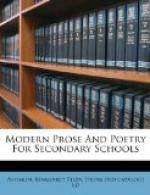of truth,—the fact that his wife was really
dead, and that he had not seen his family for two
years,—why should he not place implicit
faith in all the fictions reared upon it? It was
probable that he felt a real sorrow for her loss,
and that he found a fantastic consolation in depicting
the circumstances of her death so that they should
look like his inevitable misfortunes rather than his
faults. He might well have repented his offence
during those two years of prison; and why should he
not now cast their dreariness and shame out of his
memory, and replace them with the freedom and adventure
of a two years’ voyage to China,—so
probable, in all respects, that the fact should appear
an impossible nightmare? In the experiences of
his life he had abundant material to furnish forth
the facts of such a voyage, and in the weariness and
lassitude that should follow a day’s walking
equally after a two years’ voyage and two years’
imprisonment, he had as much physical proof in favor
of one hypothesis as the other. It was doubtless
true, also, as he said, that he had gone to his house
at dawn, and sat down on the threshold of his ruined
home; and perhaps he felt the desire he had expressed
to see his daughter, with a purpose of beginning life
anew; and it may have cost him a veritable pang when
he found that his little ones did not know him.
All the sentiments of the situation were such as might
persuade a lively fancy of the truth of its own inventions;
and as he heard these continually repeated by the
contributor in their search for Mr. Hapford, they must
have acquired an objective force and repute scarcely
to be resisted. At the same time, there were
touches of nature throughout Jonathan Tinker’s
narrative which could not fail to take the faith of
another. The contributor, in reviewing it, thought
it particularly charming that his mariner had not
overdrawn himself, or attempted to paint his character
otherwise than as it probably was; that he had shown
his ideas and practices of life to be those of a second
mate, nor more nor less, without the gloss of regret
or the pretences to refinement that might be pleasing
to the supposed philanthropist with whom he had fallen
in. Captain Gooding was of course a true portrait;
and there was nothing in Jonathan Tinker’s statement
of the relations of a second mate to his superiors
and his inferiors which did not agree perfectly with
what the contributor had just read in “Two Years
before the Mast,”—a book which had
possibly cast its glamour upon the adventure.
He admired also the just and perfectly characteristic
air of grief in the bereaved husband and father,—those
occasional escapes from the sense of loss into a brief
hilarity and forgetfulness, and those relapses into
the hovering gloom, which every one has observed in
this poor, crazy human nature when oppressed by sorrow,
and which it would have been hard to simulate.
But, above all, he exulted in that supreme stroke
of the imagination given by the second mate when, at
parting, he said he believed he would go down and sleep
on board the vessel. In view of this, the State’s
Prison theory almost appeared a malign and foolish
scandal.




